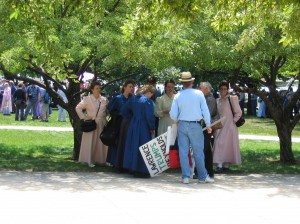Big Love's Reality Show
 Paul Harvey
Paul HarveyHere's something you don't see everyday: an FLDS (Fundamentalist Church of Jesus Christ of Latter-Day Saints) protest rally in Salt Lake City, reported on here, with photographs, by our friends at Juvenile Instructor, with background details on the controversy reported on in the local paper here, and further background and commentary here. As for the level of police state tension at today's protest gathering, suffice to say Chicago '68 it was not!
And since we're just a few days past Pioneer Day, here's the Pew Forum's report "A Portrait of Mormons in the U.S.," full of interesting data.

Comments
1) American Mormons are significantly more racially and ethnically diverse than mainline Protestant churches.
2) A large majority of Mormons questions evolution as the best explanation for human life.
The last one puzzles me a bit, as I thought Latter-day Saints were not so troubled by evolution. Perhaps many responded negatively to the question thinking that to agree meant to exclude a divine role in human life.
John, re: the Pew Report ... I was also surprised by #1, though perhaps your view of Mormonism has been colored by your place of residence the last few months. Congregations outside of the Mormon culture region tend to be more ethnically/racially diverse than what you'll see on any given Sunday in Provo.
Re: #2 ... While a growing number of LDS are not troubled by evolution (especially among the younger generation and/or intellectual crowd that you associate with), many of the older generation still cling to stridently anti-evolutionist views. The current president of the quorum of the twelve apostles, Boyd K. Packer, has expressed his own view on numerous occasions that no philosophy is as destructive "to the erosion of the family" as evolution. There is at least one Latter-day Saint who has devoted a blog to reproving his fellow Mormons that accept evolution. (http://ndbf.blogspot.com/)
But in general, I would guess you hit the nail on the head with you comment that "many responded negatively to the question thinking that to agree meant to exclude a divine role in human life." The question from the Pew survey asked "which best explains human life?" Most rank-and-file Mormons I know feel that the best explanation is some combination of evolution as taught in schools and intelligent design---that God is the author behind evolution, for instance.
I'm not Chris, but I can offer a few thoughts on this, for what they're worth:
There have been some good historical studies done on Church leaders' attitudes toward evolution, and on specific controversies surrounding the issue, several of which are published in The Search for Harmony: Essays on Science and Mormonism, published in 1993 by Signature Books. Erich Robert Paul also treats the issue briefly in Science, Religion, and Mormon Cosmology (UI Press, 1992). There is also a more recent Evolution and Mormonism: A Quest for Understanding, which isn't really a historical treatment so much as a book written by Mormons for Mormons to help them be comfortable with evolution, seeking to reconcile it with scriptural belief.
Some of the essays mentioned above are written by BYU biology professors with the unspoken but easily divined intent of showing Latter-day Saints that the official Church position is ambiguous and does not deny evolution (subtext: it could be true and therefore I can teach it!). While these are quite useful, especially for LDS students who want openness there--and they are pretty good history too, for the most part--it still leaves plenty of room for studies from different angles. A study of popular attitudes among the laity or among local leaders is much needed.
But other than these partial treatments, I do not know of an extended, scholarly treatment on the topic. It needs to be done, and whoever does it is in for some fun!
So I'd say go ahead and publish it.
p.s. fellow JIer Jordan Watkins also has a nice article on "non-authoritative authoritative" (or perhaps vice versa) Mormon responses to Darwin in the works.